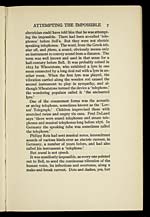Alexander Graham Bell (1847-1922)
Alexander Graham Bell : the man who contracted space
ATTEMPTING THE IMPOSSIBLE
7
electrician could have told him that he was attempt-
ing the impossible. There had been so-called ‘tele-
phones’ before Bell’s. But they were not electric
speaking telephones. The word, from the Greek tele,
afar off, and phone, a sound, obviously means only
an instrument to convey sound from a distance. The
term was well known and used in that sense for a
half-century before Bell. It was probably coined in
1823 by Wheatstone, who exhibited a lyre in one
room connected by a long deal rod with a lyre in an-
other room. When the first lyre was played, the
vibration carried along the wooden rod caused the
second instrument to play in sympathy, and al-
though Wheatstone termed the device a ‘telephone,’
the wondering populace called it ‘the enchanted
lyre.’
One of the commonest forms was the acoustic
or string telephone, sometimes known as the ‘Lov-
ers’ Telegraph.’ Children improvised these with
stretched twine and empty tin cans. Fred DeLand
says ‘ there were sound telephones and steam tele-
phones and musical telephones long before 1876. In
Germany the speaking tube was sometimes called
the telephone.’
Philipp Reis had sent musical notes, intermittent
sounds of various kinds over an electric current, in
Germany, a number of years before, and had also
called his instrument a ‘ telephone.’
But sound is not speech.
It was manifestly impossible, as every one pointed
out to Bell, to send the continuous vibration of the
human voice, its inflections and overtones, along a
make-and-break current. Dots and dashes, yes, but


